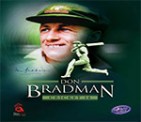Codemasters interview Agnew
James Nixon |
Codemasters Web Editor Peer Lawther recently interviewed commentator Jonathan Agnew during sound recordings for the forthcoming Brian Lara/Ricky Ponting International Cricket 2007 computer game.
A transcript is shown below.
We recently had the pleasure of ex-Leicestershire and England pace bowler and award-winning commentator Jonathan Agnew’s company for sound recordings for the forthcoming Brian Lara and the Ricky Ponting games. While he toured the studio Peer Lawther was lucky enough to pose him some questions as suggested by Codemasters members.
Hi Jonathan. How’s the game looking?
I’ve looked at the Xbox360 version, which is incredible. My stepson is an avid player of the 2005 game on PlayStation 2 and his mates will come round and play – and that was fantastic. This looks superb. I’ll have to get him an Xbox360 for Christmas!
I’ve had a good look around the game and the quality of the stadiums in particular is grand. I see Lords in the game, and fact that the crowd is now animated in the game and it’s brilliant.
You can even see the seam on the ball rotating! It is outstanding. If you think how it started off in 1996 with the very first game we thought at the time that was cutting edge – but this is awesome. The fans will enjoy it.
You’ve been involved since the start of course…
Yeah, since the very start – [Geoff] Boycott and I did the first one and that was hard work! We were doing all the commentary from scratch – so we build it up from nothing – whereas these days because I’ve recorded so much they can just dip into what I’ve said before and mix it up a bit.
The [commentary for the] first game took four days, in a studio, but you can only do so much a day as it scrambles your brain after a while! Reading scripts and ad-libbing. With that first game we tried to do like proper television commentary and visualise what was happening. We also talked each other through it which worked quite well.
Of course as each game progressed we’d have to find different ways of saying the same thing! That’s probably been the most difficult thing, making sound different, sound fresh – even something as simple as ‘a single to mid-off’. Somehow we have a find a way of saying 25 different versions of ‘a single to mid-off’!
But to watch it progress from 1996 it’s been fantastic.
So, as Manee asks, for the commentary you do in the game, do the developers give you a script, or show you a situation and tell you to ad-lib?
Well to start with [in 1996] we had an absolute mountain of paper and by the third day it gave you depression just to look at it. It was very scripted to start with. But it had to be as you had to cover everything.
And then after a couple of months we’d get calls saying “Oh, we’ve forgotten to do this!” and we’d have to go back to record more. So the first session was pretty scripted, as we had to make sure it was all there. But we did ad-libs too. What Geoff and I brought, to start with, was that if a bit of script didn’t make sense then we’d think “we wouldn’t say that” or “that wouldn’t actually happen” and ad-lib. That was actually part of the brief, to make sure there were no howlers in the commentary that reviewers would pick up on.
So basically very scripted to start with but with ad-libbing, and then more ad-libs as we’ve gone on.
We’ve had a few people with questions that are obviously frustrated cricketers – see if you can help. We trust your advice! Rippa mate asks, my batting in cricket isn’t so good – what is the secret of making a brilliant batting innings?
Well Rippa mate, my batting wasn’t that good either! So I’m probably not the best coach on that one. The best advice is try not to get out! Hit the ball, Rippa mate!
Rippa mate also asks, I’m also an off-spinner and I’m not very fast. How can you get lots of speed on the ball as well as some decent spin?
Well if you look at our man Monty Panesar and the revolutions he gets on the ball then it’s purely the strength of the wrist and the strength of the fingers. He does give the ball a real rip.
So you don’t have to bowl fast, but to get speed on the ball itself you really have to work on getting the revolutions on the ball. If you’re currently very accurate if you start spinning you’ll suddenly lose all accuracy and get very depressed and you’ll want to go back to trying to roll it out of your fingers. But you’ve got to keep going and keep practicing.
Dr Nick also has a bowling problem – “I’m a right arm aspiring-to-be fast or medium-fast bowler. What’s the best way to dismiss the stubborn little buggers who stand there, defending their wicket?”
Frighten them! Give them a couple of bouncers, then a slower ball, a bit of deception! Deception is what you want, a slow ball when he’s not expecting it or a couple of rib-ticklers, to bulldoze him out of the way. Be mean!
Another question from Dr Nick, who asks how you feel about the new 20/20 tournaments. “There has been a suggestion in a sports magazine over here in Australia that there should be 20/20 tournament in the Olympics – would you think that would work?”
Yes, it was mooted for 2012 but then they kicked it out. But it would be great – it’s always the problem with the Olympics over the professionalism issue but they did talk about having an under-21 or under-23 tournament as part of it instead.
But 20/20 in fantastic – it’s revolutionised the way people come and watch cricket here. Some were rather sniffy about it, especially the Asian cricket boards – but that’s for a different reason, as they want longer games so there are more adverts. So they’re playing it down a bit.
But now we’ll have the first proper World Cup tournament here, in 2009, and there’s one in South Africa next year, and I think it’s fantastic. It’s a bit of a contradiction that people say it’s for kids, when actually the people you see at the matches are of all ages. They go and watch it because it’s an exciting form of cricket.
So you feel it’s reinvigorated cricket?
Oh yes, for a while it certainly has and will do for years – then it’ll go to 10/10 then 5/5 then 1/1 then we’ll all give up! But for now it’s certainly injected a huge amount of interest in this country and wherever it’s played. To see a little county ground like Grace Road full [because of 20/20 cricket] is fantastic.
So do you think cricket can ever become a very large sport compared to football again, or will it always be seen as the ‘summer sport’?
Can you guess where the most development is being made at the moment? China. And they’re really pushing it there – they’ve got a lot of Quick Cricket gear out and there and they’re getting it into schools. The ICC – after they rather failed in America – are really are looking at China. Of course it’s all under the Asian satellites so you can imagine it would all work from a visual point of view.
But will it be ever global? Unfortunately not – there’s still lots of ‘blackholes’, America being one, despite all of the ex-pats out there. I doubt we’d be able to get the average American involved with the game.
But Canada’s not a bad side – they’ve got more real Canadians playing now rather than West Indians and Asians that just happened to be living there. That’s the key…
Would ever see it coming out of the ‘old Empire’ – the commonwealth?
It would be interesting to see how China fair. Historically, and at the moment, it’s still commonwealth-centric though.
Nix05 enquires, how do you get the ball to perform reverse swing? What do you do with the seam?
You don’t do much with the seam, but you’re doing lots with the sides of the ball. There are lots of different theories about reverse swing but mostly it is about keeping the ball absolutely dry, that’s the most important thing. One side you keep smooth and make as shiny as possible, the other side you ignore so end up with one very smooth side and one very rough side. Again – keep it dry. Any wet in the ball and it doesn’t work.
Simply reverse the way you hold the ball so you’d use the shiny side with a new ball and then reverse that round with reverse swing. So if you have an old battered ball, 45 overs old of something, and you’ve let one side really wear, you’d turn it around.
Whereas if you had a new ball the worn side and bowled an outswinger the shiny side would be on the outside and rough side would be on the inside. But with a reverse swinging ball you reverse it around so that the rough side becomes the shiny side – so it looks to the batsman as if it’s going to be an inswinger, but in fact, because of the reverse swing, it swings out.
So that’s what you have to do – you’ve got to bowl full, you’ve got to bowl with a fairly low-ish arm and you’ve got to bowl pretty quickly. You’re not going to be able to bowl slow reverse swing. But nothing with the seam – just hold it upright.
Going into the current cricket world, Bob Bamber asks that assuming Giles is fit, Monty Panesar or Ashley Giles for this years Ashes?
Very good question! For me now it would be Monty – they have to take five bowlers and there’s always been the question over Giles’ batting and Monty is brilliant, he really is. He’s not a great batsman either – although he’s no mug – but he gets good people out. He got the top Indians out, the top Pakistanis out – he’s really a top-class bowler. It would seem crazy to go into a game we’re trying to win with the main wicket-taking spin bowler sitting on the sidelines.
I can see them both playing in Sydney, possibly in Adelaide but otherwise I’d have Monty in there. I’m not sure they will do though – for Brisbane, if they’re both fit they might go cautious and have Giles batting at eight and leave Monty out.
Rippa mate again – who do you think is the most entertaining cricketer in international cricket now and why?
Good question – have to go with Andrew Flintoff. I used to like Lance Klusener, and also you’ve got Shane Warne – but I think Flintoff brings so much to the game; he’s massive hitter, brilliant slip fielder, generally quick attacking bowling and all-round nice bloke so I’ve got to go for him.
To Home Park Homer who asks, “Considering Strauss’s excellent captaincy performances in this series, should he be retained as captain in for the Ashes given Flintoff’s dubious fitness? Or would this undermine Flintoff’s authority now he has been awarded the winter captaincy?”
I wouldn’t say Strauss’ captaincy has been excellent – I’d say it’s been steady. I don’t think he’s done anything exciting, but he hasn’t made any howlers, he’s done a very steady job. If you were to read a recent article of mine in the Evening Standard you’ll see I wrote a piece about this very thing!
I would go for Flintoff simply because I think we’ll need someone special in Australia – they’re pretty angry down there [over losing the Ashes last year], they’re like a wasps’ nest, so we need an inspirational captain. Flintoff did a good job in India so he’s the man.
Go back a stage to this time last year and we were debating Vaughan’s successor and people would have said Strauss. Had Vaughan’s knee given way before he went to India last year then Strauss would have got the job, but his knee gave way to day before, so the team was in a mess and they gave it to Flintoff.
And I think he’s an excellent captain – it is hard work for him but you know Freddie – he can have a few beers and get away from it for a couple of days and then get back to it so I would definitely have Flintoff as captain.
The Boy Jenkins enquires, having seen so many of the world’s wicket keepers over the last few years who would you rate as the best of those currently playing in the world, and who should be England’s first choice?
Well England now have Chris Read; I’m not entirely convinced by his batting but as a wicket-keeper he’s brilliant.
Others – Gilchrist is a fine keeper, Boucher is a fine keeper. Sangakkara has disappointed me here; he hasn’t recreated his earlier form. Kamran Akmal as well.
The key nowadays is they all have to be good batsmen – they’re expected to bat. There’s little choice otherwise these days.
Lee Payne writes, “Is it difficult to commentate on the radio then commentate on television? Do you have to paint a very detailed picture in the listener’s mind?
Good question – well, commentating for radio and television is totally different. I much more enjoy radio because you are free to talk about what you want. You do paint the picture, you can have more fun and it’s much more relaxed.
In television you’ve governed by the monitor and what you can see, and you end up saying the obvious too much. I think nowadays some television commentators talk far too much – they should let you see what’s going on and not repeat the action parrot-style.
Of course we in radio can say what we want, and so as long as the audience believes us, then you’ll have a good idea as to what’s going on.
The only thing we’ve got [with radio] is that if the action happens very quickly – for all the messing around and the leg-pulling – we’ve got to get it right. If the ball’s flying to first slip and the fielder’s got his back to you and second slip is diving then we’ve got to get it right. But that’s what the job’s all about.
Radio is certainly more fun. And television commentators would probably, grudgingly, admit that radio commentary is harder – as if they’re in doubt they simply shut up whereas we can’t do that.
But there’s still camaraderie between us all. I’ll go and sit in the Sky box and listen to what they’re doing. We all get on very well.
Do you listen to your voice in the game or TV/radio and be critical of what you’ve said and how you’ve said it? Do you ever look back and feel proud that you’ve called a play exactly right?
Yes, I do listen back. Every once in a while I’ll get the engineers to record a twenty minute section of my commentary to check over because you get stuck using various phrases, words and commentary can very easily become repetitive. Unless someone’s brave enough to tell you you’re repeating phrases you have to listen to yourself over and over again.
There are times that you might regard saying something frivolous at the time – another reason to go over the commentary afterwards.
A recent one was the famous Inzamam wicket at Headingley and I was commentating on it. It’s one of those you’ve got to get right at the moment – you can have a bit of fun with it but afterwards you’re not sure whether you got the tone right on it. And if I’d got the tone wrong then I’d say that, but listening back I was pleased – I was happy with that as that’s the one that will get played and played and played.
You’ve got to be honest with yourself and so for any budding commentator you practice by sitting in front of the television and commentate away and record both the telly and commentary at the same time. Then play both recordings back and see how you got on. Hone your skill that way – it’s quite difficult, especially with watching the television as you can’t see the whole field. But that’s the best way to learn how to do it.
Finally, travelling must be great. But you ever think that you’d just like to go home and have a cuppa?
Regularly! It’s a great job and I wouldn’t do anything else but we are away from home an awful lot. There’s burnout in the players – and there’s burnout in the journalists as well.
A World Cup football tournament is on for a month whereas we’re away for over three months each winter, but that’s all part of the job and I’ve got a pretty decent wife who comes out to see me so it’s not too bad.
The sad thing about travelling nowadays is that we always go to the same places all the time. There used to be up-country games and that was interesting as it was a new place to go, whereas now we go to same cities and the same grounds and the same airport and there’s less chance to explore.
The games are so much more condensed nowadays – before there were three or four days when you could nip off and see something – but there’s no chance now. It is much more formulaic in that respect.
Jonathan – thank you.







Leave a comment